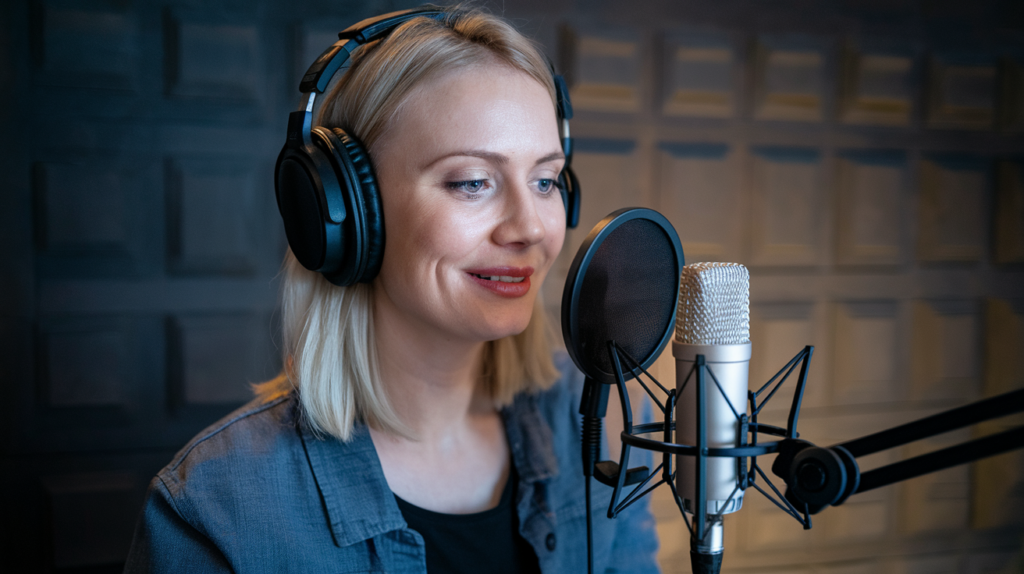Key Takeaways
- Understanding Pronunciation: Mastering unique Czech sounds, especially the letter „ř“ and vowel combinations, is crucial for accurate voiceovers.
- Cultural Nuances: Adaptation of phrases and idioms is often necessary for effective communication, as direct translations may not resonate with the audience.
- Dialect Variations: Familiarity with regional dialects enhances relatability; different areas in Czech Republic have distinct pronunciations and vocabulary.
- Technical Setup Matters: Investing in high-quality recording equipment and ensuring proper studio setup are vital for achieving professional sound quality.
- Practice Techniques: Regular practice through repetition, self-recording, and mimicking native speakers can significantly improve pronunciation skills.
- Collaboration with Experts: Working with voice coaches and experienced producers can provide valuable insights and enhance the overall quality of your recordings.
Ever tried recording a Czech voiceover and felt like you hit a wall? You’re not alone. Many voice artists face unique challenges when diving into this beautiful yet complex language. From pronunciation quirks to cultural nuances, navigating these hurdles can be daunting.
Understanding Czech Voiceover Basics
Recording a Czech voiceover presents unique challenges that require specific attention. The Czech language, with its distinct sounds and pronunciation rules, can be tricky for many voice artists. You might encounter consonant clusters that don’t exist in English or vowel combinations that could trip up even seasoned voice actors.
Understanding the phonetic intricacies is crucial. For instance, the letter „ř“ has no direct equivalent in English, making it essential for voice talent to master this sound to avoid mispronunciations. Additionally, stress patterns in Czech words differ from those in English, which may affect the overall delivery of your script.
Cultural nuances also play a significant role in effective communication through voiceovers. Certain phrases or idioms may not translate well, requiring adaptation instead of direct translation. This understanding helps ensure your message resonates with the intended audience.
When selecting a voice over artist for your project, consider their familiarity with these aspects of the language and culture. A skilled voice over talent brings not just vocal skills but also cultural insight to their performance, enhancing authenticity and engagement.
Mastering the basics of Czech voiceovers involves more than just reading scripts; it requires an appreciation for linguistic details and cultural context that make every recording stand out.
Common Challenges in Recording Czech Voiceovers
Recording Czech voiceovers presents unique challenges that can trip up even seasoned voice artists. Understanding these hurdles is crucial for achieving high-quality recordings that resonate with your audience.
Language Nuances
Czech is rich in linguistic nuances, which makes mastering it essential for effective communication. Pronunciation poses a significant challenge due to distinct sounds and combinations, such as the notorious „ř.“ This sound lacks an English equivalent, creating difficulties for many voice actors. Additionally, stress patterns vary from those in English; knowing where to place emphasis can change the meaning of words entirely. A skilled voice actor recognizes these subtleties and adapts their delivery accordingly to ensure clarity and authenticity.
Dialect Variations
Czech has various dialects that differ across regions. These variations influence pronunciation and vocabulary, affecting how your message comes across. For instance, what’s common in Prague may not be understood elsewhere in the country. When hiring a voice over talent, consider their familiarity with regional accents; this knowledge enhances relatability and engagement with local audiences. A well-versed voice over artist navigates these dialectal differences seamlessly, adding depth to your project while avoiding potential miscommunications.
By being aware of these common challenges—language nuances and dialect variations—you set yourself up for success when recording Czech voiceovers.
Technical Aspects of Recording
Recording Czech voiceovers involves specific technical considerations that can significantly impact the final product. Understanding these aspects ensures a smooth recording process and high-quality results.
Equipment Needs
Selecting the right equipment plays a crucial role in capturing clear, professional sound. You’ll want to invest in:
- Microphones: Use high-quality condenser microphones for their sensitivity and clarity, ideal for voiceover work.
- Audio Interface: A reliable audio interface connects your microphone to your computer, ensuring accurate sound capture.
- Headphones: Closed-back headphones are essential for monitoring recordings without bleed into the mic.
- Pop Filter: This tool reduces plosive sounds, helping maintain vocal clarity during recording sessions.
Do you really want to compromise on sound quality? Using top-notch gear helps deliver polished voiceovers that resonate with listeners.
Studio Setup Considerations
A well-thought-out studio setup enhances recording quality. Pay attention to these elements:
- Acoustic Treatment: Soundproofing materials minimize echo and background noise, creating an optimal environment for voice talent.
- Room Size: Smaller rooms often require more treatment but can provide a cozy atmosphere. Ensure there’s enough space for movement while maintaining comfort.
- Positioning: Place the microphone at mouth level and maintain distance to avoid distortion. Experiment with angles until you find what works best for your voice.
Tips for Overcoming Difficulties
Recording Czech voiceovers can be a rewarding experience, but overcoming challenges makes all the difference. Here are some tips to help you navigate common difficulties.
Practice Techniques
Practice makes perfect, especially with tricky pronunciations and unique sounds in Czech. Utilize these techniques:
- Repetition: Repeat challenging words or phrases multiple times until they feel natural.
- Recording Yourself: Record your practice sessions to identify areas that need improvement.
- Mimicking Native Speakers: Listen to native speakers and mimic their pronunciation, intonation, and rhythm.
- Phonetic Exercises: Focus on specific phonetic intricacies like the letter „ř“ through targeted exercises.
These methods build confidence and enhance your skills as a voice artist.
Working with Professionals
Collaborating with seasoned professionals can vastly improve your recording experience. Consider these aspects:
- Seek Guidance from Voice Coaches: Voice coaches specializing in Czech can provide tailored feedback on your performance.
- Engage Experienced Producers: Producers familiar with Czech voiceovers understand the nuances of sound quality and studio setup.
- Utilize Feedback Loops: Regularly seek constructive criticism from peers or mentors to refine your technique.
Working closely with experts not only enhances your understanding of the language but also elevates the overall quality of your recordings.
Conclusion
Recording Czech voiceovers presents unique challenges that require both linguistic and technical expertise. Mastering pronunciation and understanding cultural nuances are essential for delivering an authentic performance. The intricacies of the language demand practice and familiarity with regional dialects to avoid miscommunication.
By focusing on these elements and utilizing effective recording techniques, you can significantly enhance your voiceover quality. Working closely with professionals can provide valuable insights and help you navigate any difficulties you encounter. With dedication and the right resources, you’ll be well on your way to mastering Czech voiceovers and impressing your audience.
Frequently Asked Questions
What are the main challenges of recording Czech voiceovers?
Recording Czech voiceovers presents challenges such as pronunciation difficulties, cultural nuances, and understanding distinct sounds like „ř.“ Voice artists must navigate complex consonant clusters and vowel combinations while mastering stress patterns to convey accurate meanings.
Why is understanding cultural nuances important in Czech voiceovers?
Cultural nuances enhance effective communication. Certain phrases may require adaptation rather than direct translation, ensuring the message resonates with the audience. A skilled voice artist understands these subtleties, enriching their performance’s authenticity.
How do dialect variations affect Czech voiceover recordings?
Dialect variations across regions can influence pronunciation and vocabulary. Terms familiar in Prague might not be understood elsewhere, making it essential for voice artists to be aware of these differences to avoid miscommunication during recordings.
What technical aspects should be considered for Czech voiceovers?
Selecting high-quality equipment like condenser microphones, audio interfaces, and pop filters is crucial. Additionally, proper studio setup—including acoustic treatment and microphone positioning—ensures clear sound quality for professional-sounding recordings.
What practical tips can help improve skills in recording Czech voiceovers?
Voice artists can enhance their skills through repetition, recording themselves, mimicking native speakers, and phonetic exercises. Collaborating with professionals like coaches or producers for tailored feedback also significantly improves performance quality.







